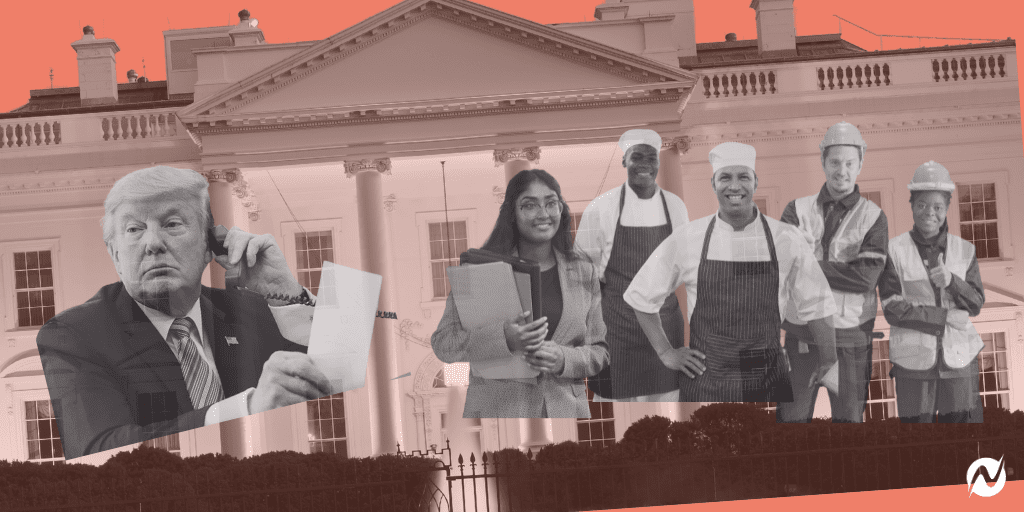Share
KEY TAKEAWAYS:
- New leadership in federal agencies may reverse recent changes
- Controversial issues like DEI may attract more public scrutiny
- Federal deregulation means focusing on compliance with state rules
- Immigration crackdowns will reduce the available labor force in some industries
Regardless of how you feel about the 2024 election results, a second Trump presidency is sure to significantly impact American businesses in the years ahead. Regarding post-election HR implications, Trump’s supporters are optimistic about federal deregulation and lower taxes. Skeptics are warning about the negative consequences of tariffs and trade wars. Before office arguments get heated, revisit your policies on politics in the workplace.
Whatever happens in the big picture, HR departments should prepare for the upcoming regime change.
Learn more about the seven most significant post-election HR implications.
Regulatory activity is likely to slow considerably
Particularly in the past year, federal regulations from the DOL, NLRB, and EEOC have affected overtime, independent contractors, and non-compete policies. Some regulations were passed in order to repeal and replace rules from the previous Trump administration.
Additionally, in cases where Biden-era policies have been challenged in court, it’s safe to expect that the Trump administration will dismiss and withdraw any ongoing appeals. This is something that must be monitored throughout the year by HR staff.
Potential limitations on DEI could be put in place
In his first term, Trump signed an executive order against “divisive concepts” and “race and sex scapegoating.” Biden used executive orders to overturn those changes and promote DEI in federal agencies. When Trump signs his first batch of executive orders in 2025, they’ll probably include DEI-related rules for federal agencies.
If your company provides contract work for federal agencies, then you know to watch for changing rules. Major corporations could be accused of discrimination for the phrasing of their DEI “ambitions”, which could be interpreted as evidence of racial or gender-based discrimination.
Immigration crackdown affecting the workforce
Trump has talked a lot about immigration reform, including the using the National Guard for mass deportations. Companies that employ illegal or undocumented immigrants could be raided by authorities.
When border control is tightened, industries that rely on migrant labor will see rising costs and worker shortages. Mass deportations could potentially disrupt several parts of the US economy, including agriculture, construction, manufacturing, and service industries.
Regime changes at various federal agencies
EEOC, Homeland Security, Education, Health and Human Services Department, EPA, and many more federal agencies are expected to look significantly different in Trump’s second term. This new leadership will certainly change the way agencies tackle controversial issues and enforcement, but your company still needs to maintain compliance with existing rules.
Federal deregulation leads to increased states’ rights
When there’s a rollback on federal regulations, HR must stay updated specifically on the regulations in your state. For example, GOP leadership is unlikely to raise the federal minimum wage, but 30 states already have a minimum wage higher than $7.25. Whereas U.S. Supreme Court Justice Louis Brandeis described states as “laboratories of democracy”; federal deregulation allows states to experiment with different strategies for regulating employers.
Healthcare: Decline of Obamacare?
Trump’s 2016 victory came with plans to repeal and replace Obamacare. The Affordable Care Act is still controversial, but Trump claims to have “concepts of a plan” to replace Obamacare with something better and less expensive.
Without specific GOP proposals for a totally new program, smaller changes may come from expiring subsidies and legal challenges. Pundits emphasize that ACA’s Applicable Large Employer Mandate under IRC 4980H is not going anywhere in the foreseeable future. Make sure your HR software helps with ACA compliance.
Changes in tariffs and taxes
Trump plans to rely more heavily on tariffs instead of taxes to fund the federal government. Tariffs look like an appealing way to reduce foreign competition for American businesses, but it’s hard to predict how retaliation and rising costs will ultimately affect the economy. Several tax policies have been proposed, like extending the expiring changes from the 2017 Tax Cuts and Jobs Act (TCJA).
Trump has talked about reducing the corporate tax rate for domestic production and bringing back the deduction for state and local taxes (SALT). Overtime pay, tips, and other sources of income may become exempt from income tax. Keep your payroll compliant with Address, Compensation, and Tax Verification (ACT).
Discover how Netchex can help your business adapt to various post-election HR implications:
Related articles

Why Dealertrack Dealerships Choose Netchex When Payroll and HR Need to Run Smoother

Introducing HR Reporting with AI that Can Actually Impact Your Bottom Line

The Real ROI of Streamlining HR and Payroll

